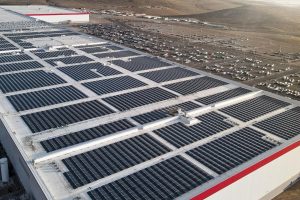The Tesla Cybertruck. The Tesla Roadster. The Tesla Semi.
The three products above saw new expected production dates from Tesla CEO Elon Musk on Thursday at its “Cyber Rodeo” at Gigafactory Texas. Despite Tesla accomplishing so many incredible things over the past fourteen years, from basically financial ruin to the most valuable automaker in the world, 2023 is a chance for the company to truly break away from its competitors once and for all. It just has to come through on its promises.
It is no secret Tesla has come up short with some of its delivery timelines. The Cybertruck was slotted for production in late 2020. The Roadster’s revamped version has been pushed back several times. The Semi is still a priority, but so are saving battery cells for the mass-market vehicles Tesla produces. Full Self-Driving was slotted to be completed for the first time in 2018. 30,000 Robotaxis were expected to hit the streets by the end of 2021.
Then the pandemic hit in 2020, and the entire automotive industry felt the effects. While resilient in its efforts to avoid chip shortages, supply bottlenecks, and an extending backlog, Tesla took matters into its own hands. It said it developed 19 versions of microcontrollers thanks to the efforts of its in-house engineers, it ramped production of its 4680 battery cells, which it implemented in the first Made-in-Austin Model Ys, and it opened two new factories in the first four months of 2022, effectively doubling its production output as a company.
But more than anything, 2023 is a chance for Tesla to truly break away from its competitors in terms of its product line. While many companies are focused on passenger or commercial electric vehicles exclusively, Tesla has an opportunity to expand its product line to fit nearly every sector of transportation.
The Cybertruck will be the fourth all-electric pickup on the market, following the Rivian R1T, the GMC Hummer EV, and the Ford F-150 Lightning.
The Roadster will be the first of its kind: an estimated 600+ miles of range combined with an already proven and lightning-fast powertrain, and it might even hover.
Meanwhile, the Semi will expand the commercial electric vehicle market as Volvo’s VNR electric semi, and Nikola’s plans for commercial EVs continue to work through a tumultuous year.
The Cybertruck is absolutely the priority for Tesla: the truck has over 1 million pre-orders, and the list of reservations continues to grow with every new sighting. If Tesla can dial in production of the Cybertruck in 2023, it will not only deny so many naysayers of their skepticism, but it will also prove the company has effectively outgrown its cell supply shortages and parts bottlenecks.
The Roadster, while more of a novelty item, will bring the automaker’s revamped and revolutionary vehicle back from the dead. After so many customers and Referral Program winners may have given up on ever seeing the next-gen Roadster, Tesla bringing that project back from the dead would mean so much to the early adopters and the patient and loyal fans who have ached for the futuristic and sleek rebirth of the original Tesla vehicle.
The Semi would only prove Tesla dominance even further. It would be a large-scale commercial vehicle that supplements Tesla’s already robust and expansive product line. Covering the luxury, mass market, pickup truck, and commercial sectors would be monumental for a company that has already changed the overall architecture of the global automotive industry.
“My view is that many on the Street and the auto industry do not appreciate just how important and revolutionary the Austin factory is for Tesla,” Wedbush analyst Dan Ives said. “It changes the game for Tesla from a supply perspective along with Berlin-further flexes production muscles when other autos struggling.”





